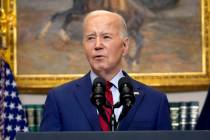COMMENTARY: Let’s reconsider life tenure for the U.S. Supreme Court
Former Senate Majority Leader and fellow Nevadan Harry Reid has mostly stayed out of politics since his retirement two and a half years ago. So it’s significant that in a recent interview he pinpointed the antiquated structure of our federal courts as one of the obstacles impeding comity and progress in Washington.
Just as many constitutional scholars have recently suggested, Reid believes it’s time to rethink the lifetime tenure granted to federal judges, including Supreme Court justices. “When the Constitution was written,” he observed, “no one ever expected judges to live to be 80 years old. Now they’re going into their 90s in some places around the federal court system. So I think that we have to jiggle that around a little bit.”
This idea of “jiggling” judicial terms has caught on this decade in presidential politics. Four years ago, Republican candidates Ben Carson, Ted Cruz, Mike Huckabee, Rand Paul and Marco Rubio supported ending life tenure for Supreme Court justices. This year, more than a dozen Democratic candidates for president have expressed support for statutory and constitutional proposals that would achieve much in the same.
Despite agreement across the aisle on this issue, our elected officials remain beset by acute polarization and ultra-partisanship and have failed to act. Here is what we’re left with: Instead of preserving the rule of law and judicial independence, Supreme Court tenures that today reach 30 or 35 years are acutely raising the stakes of each appointment, turning confirmations into battles to control the outcomes at the court for decades and ensuring the most partisan of candidates are picked whenever vacancies occur.
There are several proposed revisions to this system, and all share the same purpose of limiting the power of individuals to influence constitutional jurisprudence beyond what’s rational in a democracy. A tenure-limiting scheme would promote the search for judges who are faithful to established legal principles and make less likely the appointment of those dedicated to reaching particular political outcomes. When the appointment process features a uniform pattern of rotation of justices, no single party or individual is set up to dominate constitutional jurisprudence over the medium or long term.
One popular term limits proposal, for example, would maintain justices’ life tenure in the judiciary but would require them, after 18 years on the high court, to rotate back to a circuit court, where nearly every modern justice has come from. What’s more, several former justices — including Sandra Day O’Connor, who retired in 2006, and David Souter, who retired in 2009 — have done just that unbidden, and the lower courts on which these former justices served benefited greatly from their high court experience and expertise.
One added advantage to “jiggling” justices: regularized appointments would also curtail the modern-day use of presidential power to influence when there will be Supreme Court vacancies. A limited tenure means the public would know when each subsequent vacancy will occur, which would free us from the ugly confrontations we often experience during the confirmation process.
It’s clear to Reid and to countless Americans that we need to move away from a system where political ideology is the most crucial factor in deciding Supreme Court appointments. Ending life tenure would reduce the power of our top judges so that the resolution of political questions would once again become the charge of our political branches and not a group of unelected judges appointed some 30 years ago by a bygone generation.
High court justices today indisputably hold powerful political positions, and even if term limits were adopted, they would still have ample opportunities to craft opinions that impact their fellow citizens in critical ways. Yet our system of government, and that includes the Supreme Court, should be one that steers us away from oligarchy rather than toward it.
Thomas McAffee teaches constitutional law at UNLV’s Boyd Law School.




























